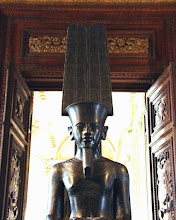Wandering Black Holes Take Food With Them
 There goes the pizza!
There goes the pizza!
Like well-prepared travelers, some wandering black holes take their food with them as they journey through-or even beyond-their host galaxies.
Some supermassive black holes at the center of large galaxies are thought to be ringed by swirling belts of hot gas, called "accretion" disks, upon which they feed. Black holes that have large quantities of matter falling into them in this way are called "quasars," and they emit so much energy that they outshine all the stars in their host galaxies.
When two large galaxies merge, their black holes also coalesce. If the black holes have unequal masses, their merger causes powerful gravitational radiation to be emitted in a single direction. Like a mighty shotgun blast, the "radiation kick" causes the black hole or quasar to recoil, at speeds of up to 10 million miles per hour (16 million km/h).
"It will not be a quasar situated in the middle of the merger galaxy. It will be a displaced quasar," explained Avi Loeb, an astrophysicist at the Harvard-Smithsonian Center for Astrophysics.
Despite recent advances in computer modeling of black-hole mergers, it was unclear whether recoiling quasars could hang onto their accretion disks (the food) during ejection from the galactic center.
New calculations by Loeb suggest they can. Loeb predicts that so long as the accretion disk spins around a black hole faster than the black hole's ejection speed, the disk will follow the black hole on its journey.
Voracious travelers
This is an easy requirement for most quasars, the accretion disks of which can spin at close to the speed of light. "The matter is so tightly bound that it follows the black hole like a herd of sheep around a shepherd," Loeb said.
Loeb estimates a displaced quasar can travel about 30,000 light-years from its galactic center before exhausting its accretion disk. Without a steady food supply, the quasar stops radiating energy and becomes a normal black hole.
"Even if you don't feed it, the [black hole] will survive forever basically," Loeb told SPACE.com.
If a wandering black hole is not traveling at high enough speeds to escape its host galaxy entirely, it will eventually fall back to the galactic center in about 100 million years, Loeb said.
"It's like throwing a stone up in the air," he said. "If you don't throw it at a high enough speed, it comes back."
Source






